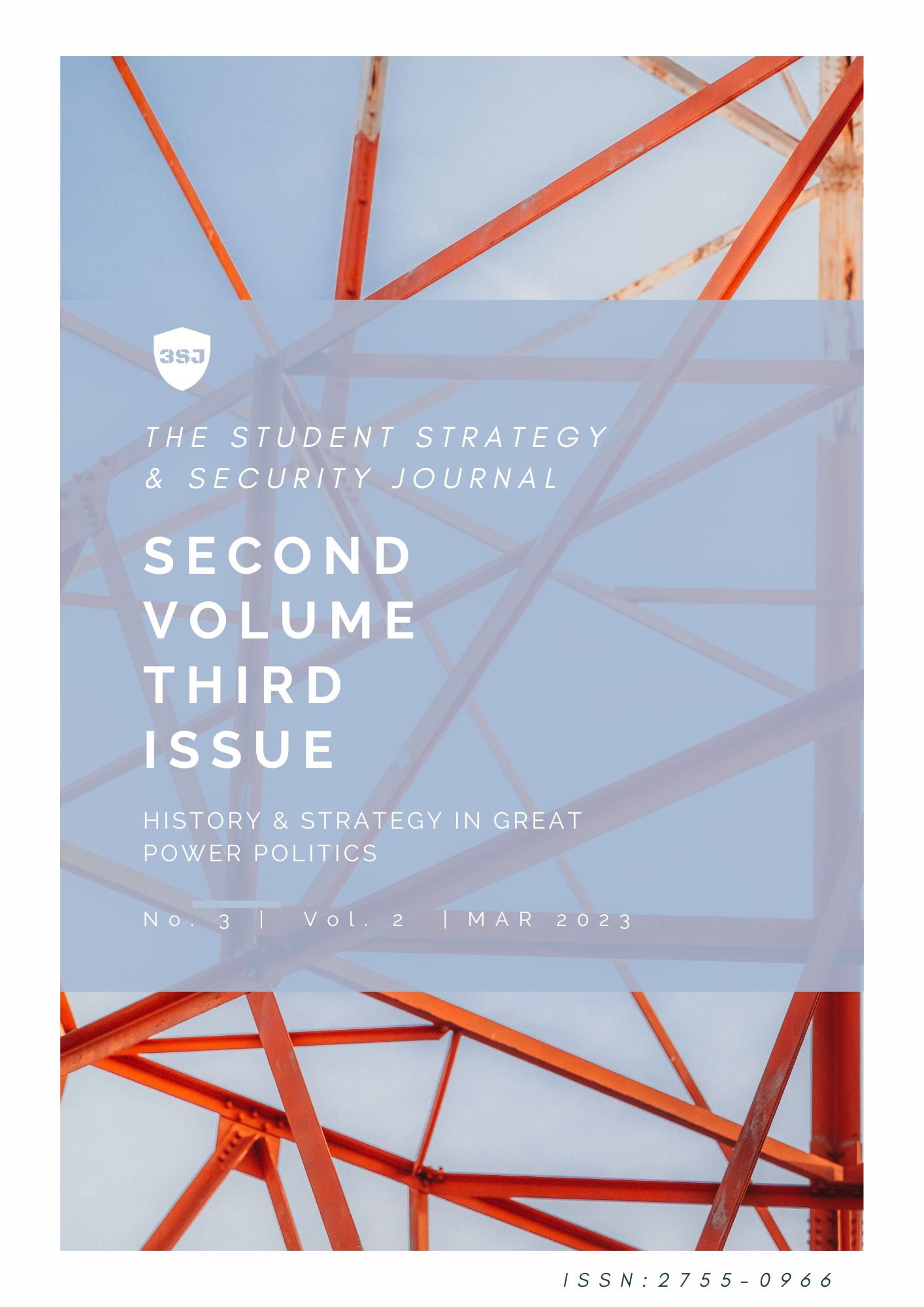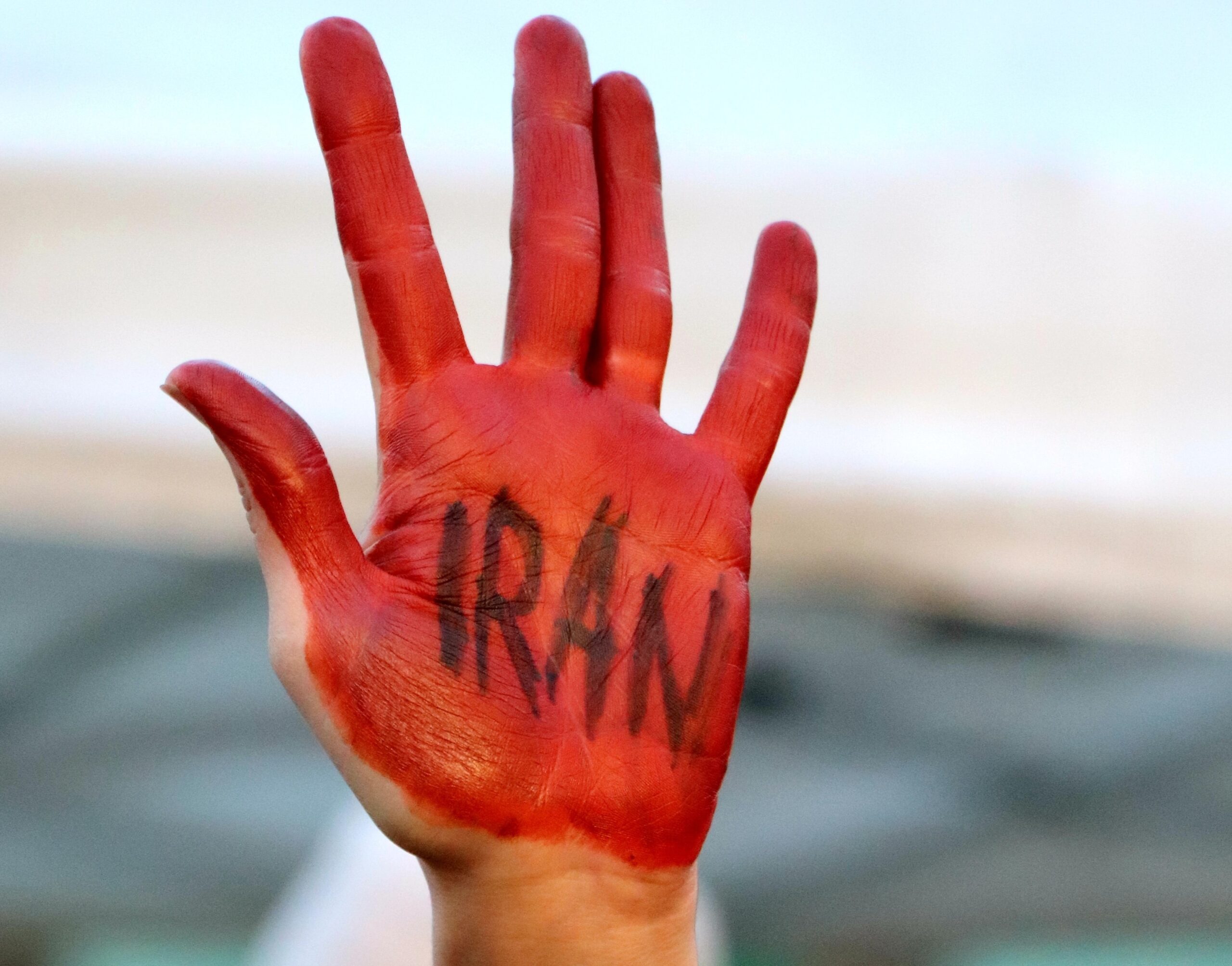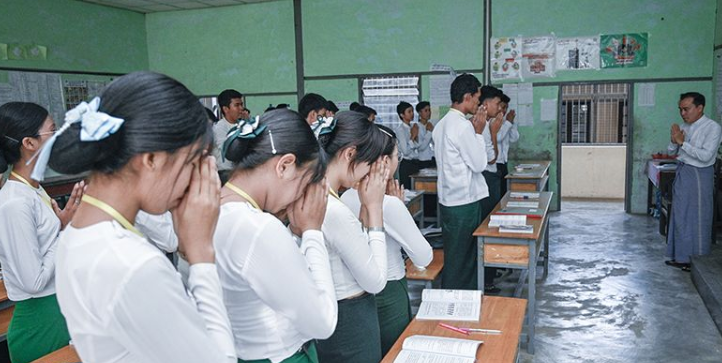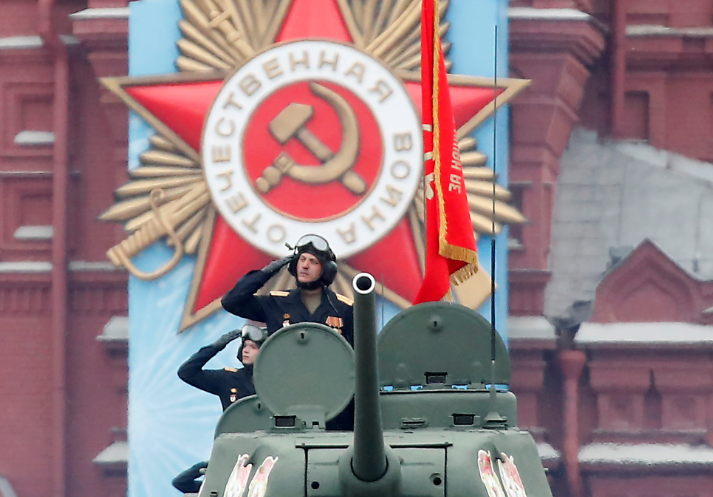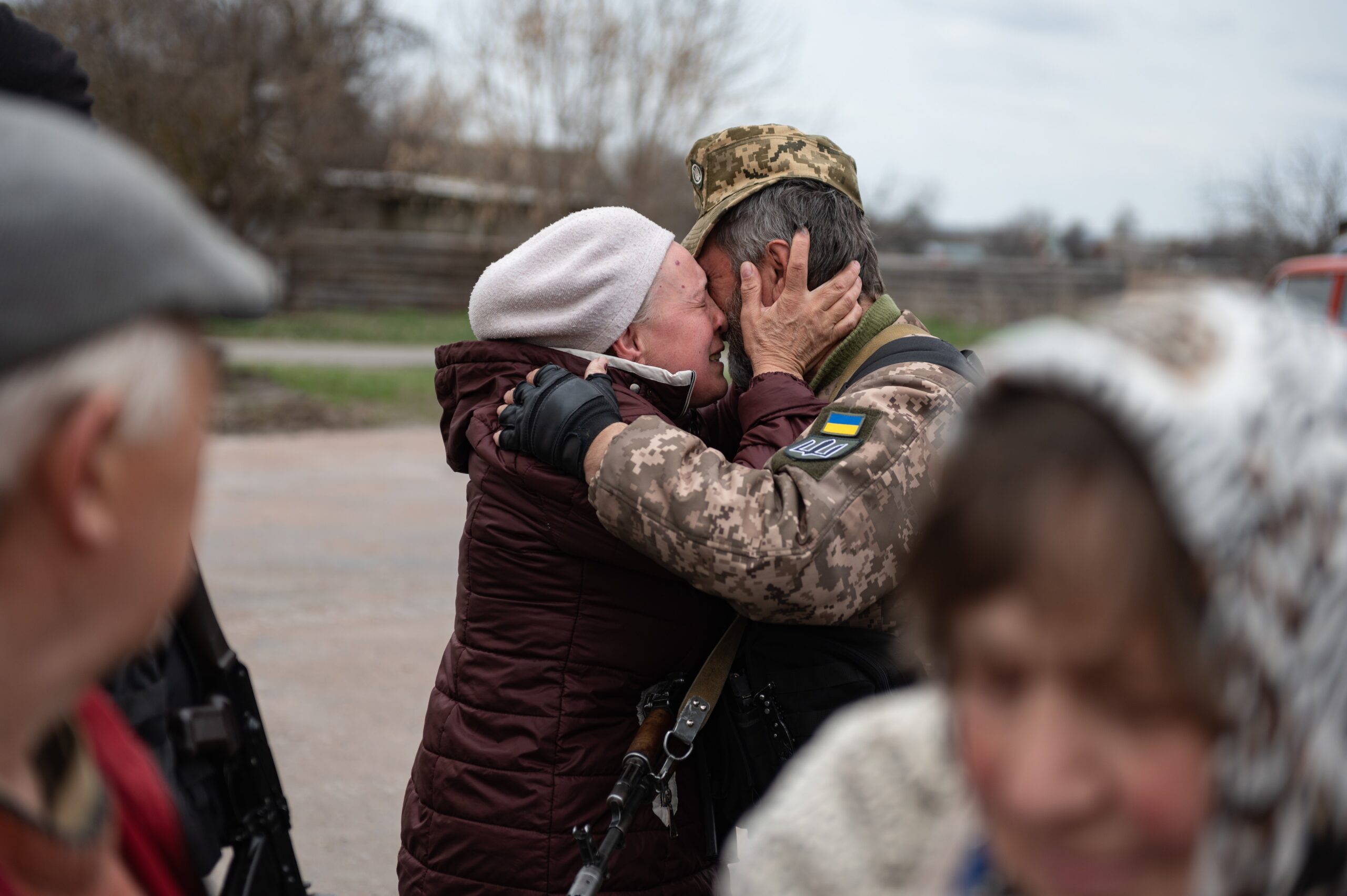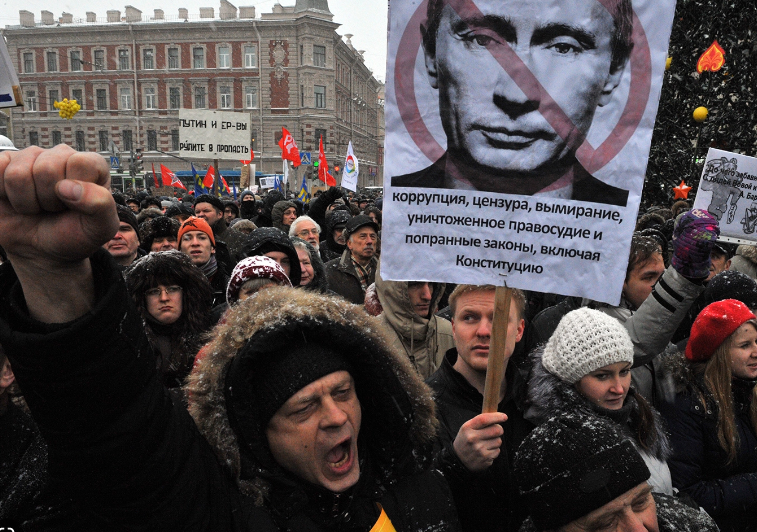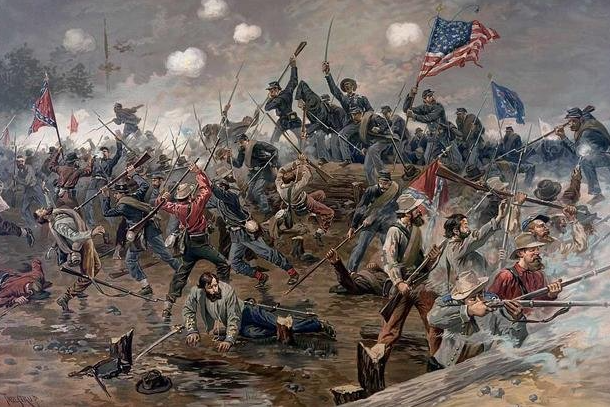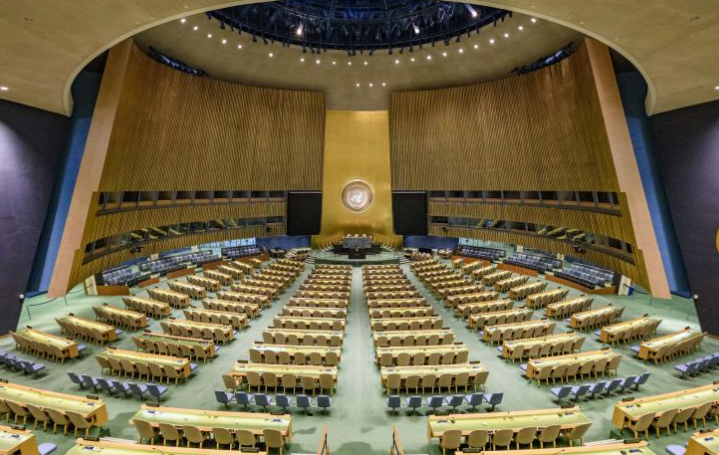THIRD ISSUE
VOL TWOMarch 2023
Second Volume Third Issue
This issue’s twelve articles are grouped into four thematic sections. The first two papers focus on Türkiye’s and the Gulf Cooperation Countries’ efforts to reshape the modern Middle East by overcoming colonial legacies. The following three articles address various methods deployed by nationalising states such as the Islamic Republic of Iran, the Republic of the Union of Myanmar and Ukraine to manage their national minorities. The next three contributions unpack the Russo-Ukrainian conflict by examining the continuities in the intelligence services of the USSR and the Russian Federation; analysing the balance of apparent and effective military power between Russia and Ukraine; and dissecting Russian elites’ interventions in Ukrainian foreign and domestic politics, all grounded in an innovative theory of ontological security. The final four articles focus on US military strategies in the planning and pursuit of war across three centuries – from a counter-factual narrative of Confederate strategy during the Civil War, to US and Soviet targeting of their respective population centres with their conventional and nuclear arsenals during the Cold War, and finally to complementary realist and idealist perspectives on the causes and outcome of the 2003 US military intervention in Iraq.
Shaimaa Magued
Türkiye’s Contested Regional Power Role from an Arab Perspective under the AKP rule
How would a state’s regional power role be impacted by foreign leaders? Building on the national role theory’s interactive approach, this study argues that Arab countries have contributed to the concretization of Türkiye’s regional power role in the Middle East before the Arab uprisings and its mitigation following their eruption in 2011. While national role theorists have underlined the potential rise of disagreements among ruling elite members in national role formulation, they overlooked the impact of foreign leaders on the formulation and crystallisation of this role. Relying on the triangulation of three qualitative research methods, findings support the significant impact of external actors on the formulation and concretization of a state’s national role, taking as a case-study Arab countries’ perceptions of and reactions toward Türkiye’s power role before and after the Arab uprisings, from 2002 until 2021.
Keywords: National role theory, Turkish foreign policy, Turkish-Arab relations, Middle East politics
Mona Ali
“A Solidarity of Fear”? Risk Society Perceptions in Gulf Cooperation Council Countries After COVID-19
The coronavirus pandemic has brought to the forefront the concept of “risk society,” first proposed by Ulrich Beck in the 1980’s. Based on this concept, this paper attempts to analyze the ongoing changes to threat perception in the GCC region and the new risk culture formulated during the coronavirus pandemic in Saudi Arabia, UAE, and Qatar. The paper relies on a qualitative content analysis of a sample of writings by Gulf intellectual elites reacting to traditional and non-traditional threats in GCC countries, in order to identify changes in the features of risk-society perceptions in the GCC region.
Keywords: Coronavirus,Risk society, Qatar, UAE, Saudi Arabia
Ghazaleh Darini
The Islamic Republic of Iran’s Domination of Iranian Religious Minorities
The Islamic Revolution of 1979 drastically changed the fate of religious minorities in Iran. During Mohammad Reza Shah Pahlavi’s reign, the previous Iranian state was increasingly more tolerant towards all its religious minorities. However, in the decade following the Revolution, the new Head of State, Ayatollah Ruhollah Khomeini, incessantly targeted specifically non-Muslim minorities. The new Iranian Islamic theocracy’s aggressive strategies in response to diversity have proven effective. As of 2012, non-Muslim minorities constitute less than 2% of Iran’s 75.2 million population, a drastic decline from 5.2% during the Pahlavi era (Choksy, 2012). This paper examines the increasingly belligerent transformation that ensued following the Iranian regime change in 1979 and its consequences for religious minorities. Accordingly, this paper identifies and assesses how the Islamic Republic of Iran responds to ethnic diversity and argues that its strategic approach to the country’s religious minorities is hegemonic control; however, the domination approach varies depending on each target group. While the Iranian Islamic theocracy dominates all minority religious communities, this paper will focus in particular on the treatment of three non-Muslim communities: the Jews, Zoroastrians, and Baha’is.
Keywords: Domination, religious minorities, Iranian Zoroastrians, Iranian Jews, Baha’i, Pahlavi government, Iranian religious intolerance, revolution
Bella Aung
Building National Identity through Schooling and Language Policies: Burmanization as a Diversity Management Strategy
States use assimilation, integration, and accommodation in various ways to regulate ethnic conflict and cultivate a common national identity. Different sectors for which states create public policies to manage diversity include the military, employment, religion, electoral politics, and education. This paper discusses the importance of policymaking around language and education in building a common national identity, using the case study of Myanmar from 1962 to the present day. By comparing the Burmanization process by different Burmese governments to French nation-building through schools and schooling in the 1800s, this paper highlights that the successful sustenance of diverse states draws from effective long-term diversity management through education reforms. It also analyzes different Burmanization policies employed by four governments of Myanmar using the categorizations of different diversity management techniques as defined by John McGarry, Brendan O’Leary, and Richard Simeon. The Burmanized education and language policies allowed for the creation of a Burmese national identity among different ethnic groups. This very identity allowed for the continued existence of Myanmar as a Union by weakening ethnic minorities’ sense of identity. From Myanmar’s example, it can be seen that diversity management through schooling as an ethnic conflict regulation strategy remains relevant in today’s politics.
Keywords: Diversity Management, Myanmar, Burmanization
Claire Parsons
National Security Effects of Ukraine’s Failure to Manage Its Minority Ethnic Population and a Recommendation for Decentralization
Ukraine’s national security and even its existence as an independent state have been at constant risk since its independence in the 1990s. This is due to intense pressure from both the Russian Federation, after the collapse of the Soviet Union, to remain in its sphere of influence, as well as from potential Western allies to become a geopolitical partner for the EU and NATO. After Russia’s invasion in early 2022, however, the question of the state’s national security has evolved beyond pure military defence, as secessionist movements within the contested Donbas region gained power through Russian support. Previous research has shown that secessionist support is highly manipulated by the Kremlin and ethnic conflict between Ukrainians and Russians living in Ukraine is manufactured. Although the largest point of contention between the two groups, language, is territorial, nationalist loyalties to Ukraine remain strong among its Russian-speaking citizens. This paper investigates how Ukraine could accommodate Russian speakers in its eastern border areas in order to maintain its territorial integrity as a sovereign state and thus, to effectively resist the Russian Federation’s political influence in this region and ongoing annexation attempts. It then looks at the case of Latvian management of ethnic difference through assimilation and domination and argues that this strategy would not best fit the Ukrainian case. Instead, it offers a decentralized approach better suited for the unique geopolitical pressures Ukraine is currently subject to.
Keywords: Ukraine, Russia, Latvia, Security, Decentralization, Donbas, Ethnic Conflict, Nationalism, Language, Secession, Assimilation, Domination
Pieter zhao
Intelligence Transformation in Post-Soviet Russia: Attempting to Reconcile the Irreconcilable
Fundamental political transformations such as a revolution or coup d’état often leave a county’s security and intelligence agencies in an existential crisis. Following such a change, the security and intelligence apparatus suddenly have to structurally transform in order to suit the newly-defined needs of the recently established government, oftentimes in contrast to the needs of the previous regime, as illustrated by the breakdown of the Apartheid regime in South Africa, for example. However, patterns of continuity within a country’s security and intelligence apparatus following a political transformation can also be observed, especially when the underlying bases of power and security paradigms persist. Accordingly, following Russia’s recent intelligence failures surrounding the 2022 War in Ukraine, this paper analyzes the transformation of Russia’s post-Soviet security and intelligence apparatus. It argues that the dissolution of the Soviet Union failed to bring structural change to Russia’s post-Soviet intelligence apparatus. Because the KGB’s successor organizations remained equally influential in the Russian Federation, despite removing the KGB’s ideological umbrella, making them bound to repeat the patterns of the past.
Keywords: Intelligence, Post-Soviet Russia, Political Change
Madison Farhood
Might vs. Will: A Realist Assessment of the Russo-Ukrainian Conflict and its Probable Outcome
As the current Russo-Ukrainian war has continued to unfold as a weaving and complex conflict over the past year, this paper takes a currently often overlooked approach by using the core assumptions of realism to describe the power balance that has emerged between the two combatant forces over this time period. While this paradigm has been critiqued for being inconsistent with the modern realities of global politics, this paper demonstrates that realism can still be relevant in analyzing international war and conflict. The theoretical analysis begins with a brief overview of classical realism, so as to explain the innate desires nations have in maintaining and increasing their power and influence, and then moves to compare these motivations. By analyzing the uses of different power sources by Russia and Ukraine based on realist assumptions, being apparent power versus effective power, this paper claims that while Russia holds stronger apparent military power than Ukraine, Ukraine has more effective military power, thus creating a continuous warfare environment. The article concludes by attempting to provide a ‘realist’ solution grounded in a rational and reasonable negotiation process respecting the national interests of all participants. Ultimately, this theoretical perspective attempts to demonstrate the continuing influence that ‘power’ continues to play in international relations today, as seen through the case study of the Russo-Ukrainian war.
Keywords: Realism, effective power, military power, balance of power, international relations, Russian-Ukrainian war, resolution
Brooke Lewinsky
The Ukrainian War as Catalyst to Bringing Russia In From the Cold Into the Western Alliance
This essay has two primary purposes. First, it seeks to examine how Russia has employed a strategy of weakening or even rejecting the autonomy of Central and East European countries, formerly members of the Soviet Bloc and the Soviet Union, by taking advantage of their external and internal weakness to subvert their efforts to consolidate their status as independent countries. Second, it uses an ontological security lens to understand the origin of the ontological insecurity of leading Russian political elites, and more specifically, of Russian President Vladimir Putin, effectively in power for over two decades since 2000. Additionally, it helps to conceptualize how these insecurities influence their behaviours. By introducing a feminist ontological security lens, this essay provides a prescriptive narrative for a post-Putin Russia where its transition to democracy is a reaction to the disruption of existing male dominated narratives that characterise Russia’s present nature. This paper analyses the case study of Ukraine so that we may better navigate towards a prescription for a post-Putin Russia where we may empower Russia’s pro-European/Western foreign policy direction and ultimately avoid a new Cold War era.
Keywords: Autonomy, Internal and External weakness, Ontological insecurity, Post-Putin Russia
Andrea Pezzati
Trading Space for Time: The Confederate Army’s Strategy Revisited
The American Civil War is the preferred topic of many military historians and other grand strategy practitioners. It has been widely studied from social, political, economic, cultural, and military perspectives. A lot of books and articles focus on the reasons for the Unionists’ victory or the Confederacy’s defeat. The thesis of the superiority in resources and manpower of the North has been the main explanation for a long time. Other works, like this paper, concentrate on strategy. The years before the start of the Civil War were characterized by great fervour concerning military strategy. The actions of Napoleon and the works of Clausewitz and Jomini have been influencing military thinking from the nineteenth century onwards, with the latter being a particularly strong influence in the United States. I argue that Confederate generalship, in particular General Robert E. Lee’s, had an excessively aggressive posture. The focus on relentless offensives caused the depletion of the already limited resources and men of the Confederacy. I suggest that a defensive posture could have been more successful for the South. In particular, a defence-in-depth strategy would have allowed the Confederacy to trade space for time and, eventually, to exhaust the Union army and resources. I claim that through a skilled use of Virginia’s geographic features the Confederate army could have created multiple defensive zones along a trenched front with strongholds positioned in various points for coverage and far and wide defence, leading to a strong resistance, thus enhancing its chances for victory.
Keywords: American Civil War; defence-in-depth; Jomini.
Patrick Taube
Airpower Strategy in the Cold War: How central was value targeting and city “busting” to NATO and Soviet conventional and nuclear airpower strategy?
After the invention of the aeroplane, it did not take long for militaries around the world to discuss the potential it would have on the battlefield. With the advent of the atomic bomb, the threat from the air was magnified even further. During the Cold War, scholars, generals and politicians conceptualised airpower strategies, heavily influencing NATO and WTO conventional and nuclear airpower strategy. This paper will start off by introducing the reader to the strategic theory of airpower, touching on the four schools of airpower targeting. Grounded in the analysis of NATO documents and secondary literature, this paper sets out to analyse the role that targeting of high value targets and the destruction of entire cities had in NATO and WTO airpower strategy, be it conventional or nuclear. The findings suggest, that both entities refrained from deliberately targeting the enemy’s population centres in their strategies. Nevertheless, the bombing of entire cities was an option for both sides, albeit an ultima ratio, even being cut out of the NATO strategy from 1968 onwards. However, both strategies prioritised the targeting of the enemy’s military capabilities, especially their respective nuclear arsenal.
Keywords: airpower, military strategy, Cold War, nuclear strategy, strategic theory, massive retaliation
Julian King
Weapons of Mass Self-Destruction: How United States Foreign Policy in Iraq Backfired
The essay examines the perceived failures of the United States in the Iraq War and argues that they were the result of policy objectives that diverged from the principles of realism and instead pursued neoconservative and liberal internationalist ideals. The decision to invade Iraq in 2003 is analyzed through an offensive realist lens, showing how it was motivated by the desire to secure unipolar hegemony through power maximization. It is discussed how post-9/11 and post-Cold War sentiments – alongside suspected weapons of mass destruction in Iraq –influenced the United States’ actions of self-help in an anarchical international order. The subsequent failures of the United States in Iraq are attributed to attempts to nation-build and democratize, which align with liberal internationalism and neoconservatism but are incompatible with a realist approach and are beyond the ability of state power to achieve. The resolution of the conflict under the Obama administration, characterized by a shift to defensive realism through more restrictive and prudent policy regarding U.S. foreign presence, is explained through the recognition that such objectives must be pursued internally by self-interested states and that the national interest of the United States was best served by withdrawing troops from Iraq.
Keywords: Realism, neoconservatism, liberal internationalism, hegemony, democratization, weapons of mass destruction, defensive realism, US foreign policy, Second Iraq War
Matthew Garofalo
The Second Iraq War: How Idealism Undermined the United Nations
This paper uses and Idealist approach to International Relations to evaluate why the United Nations failed to prevent the Iraq War in 2003. Idealism, which is a theory that believes it is possible to create a world of peace, has continued to be a dominant paradigm in IR since the end of the First World War. However, despite the construction of international institutions, society has continued to be plagued with wars throughout most of the 20th and 21st centuries. Through an analysis of various articles, newspapers, interviews, and public opinion polls, It apparent that factors outside of the UN’s control inhibited their ability to facilitate peace in the Middle East in the early 2000s. This paper will highlight how elements such as American Hegemony, domestic politics and non-state actors influenced American foreign policy, ultimately undermining collaboration in the international system. It will do this by specifically focusing on the influence of the Bush Doctrine, the public opinion of Americans, and lobbyists who had leverage ‘inside’ of the White House. The findings in this paper prove that bodies such as the UN are vulnerable to external forces, making them incapable of solving international conflicts.
Keywords: United Nations, Idealism, Hegemony, State Actors
Contact us
Become a contributor

